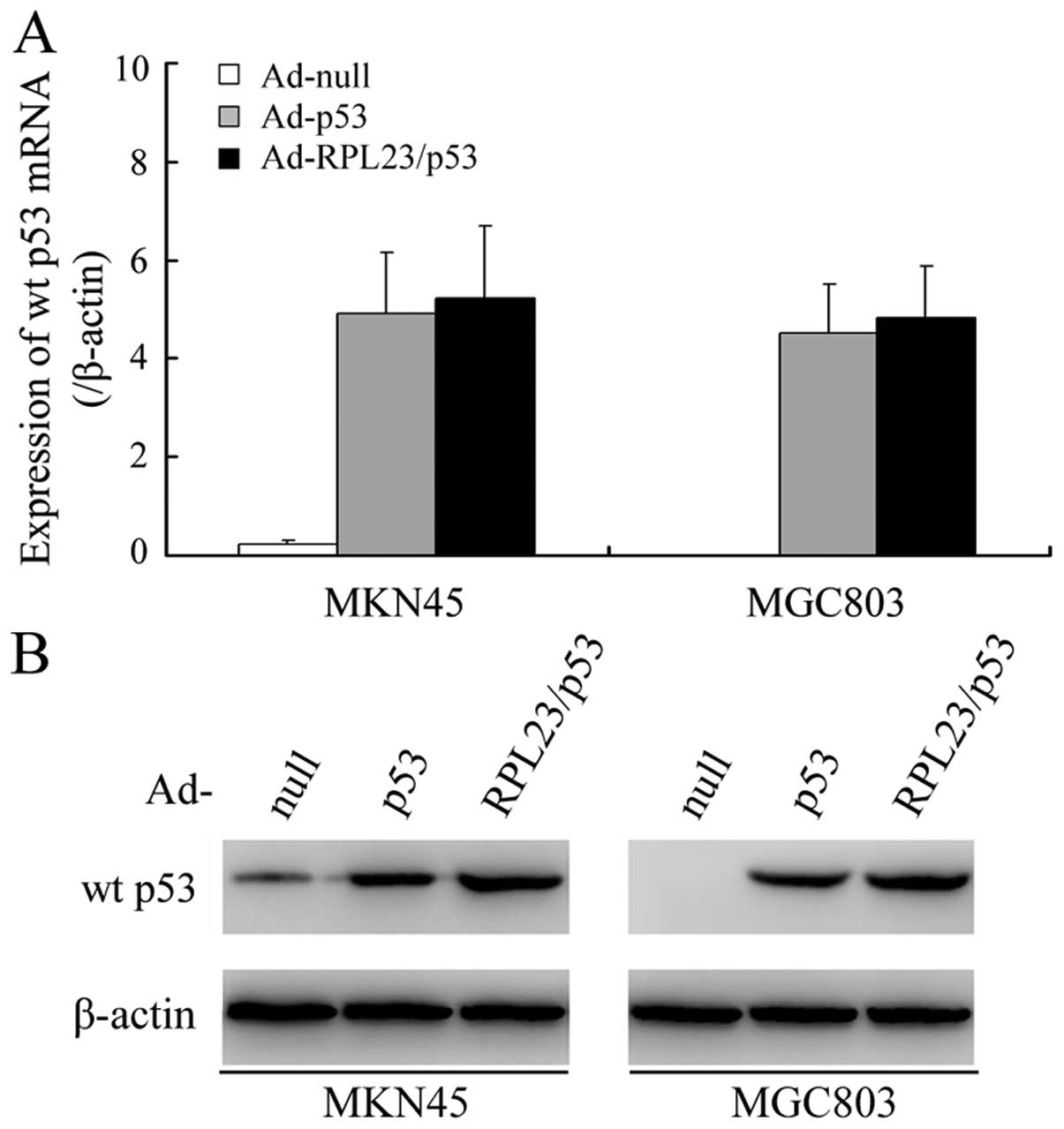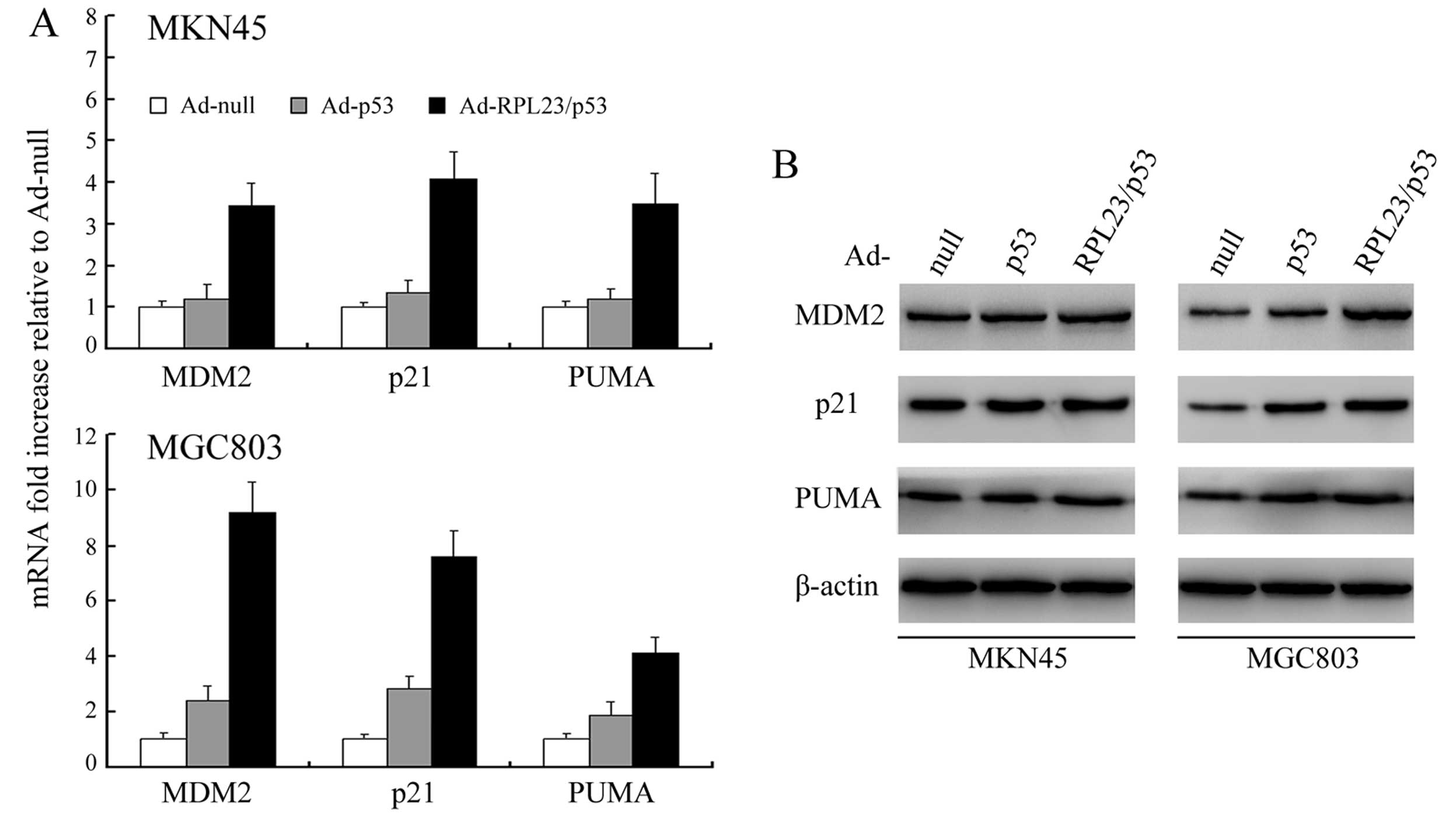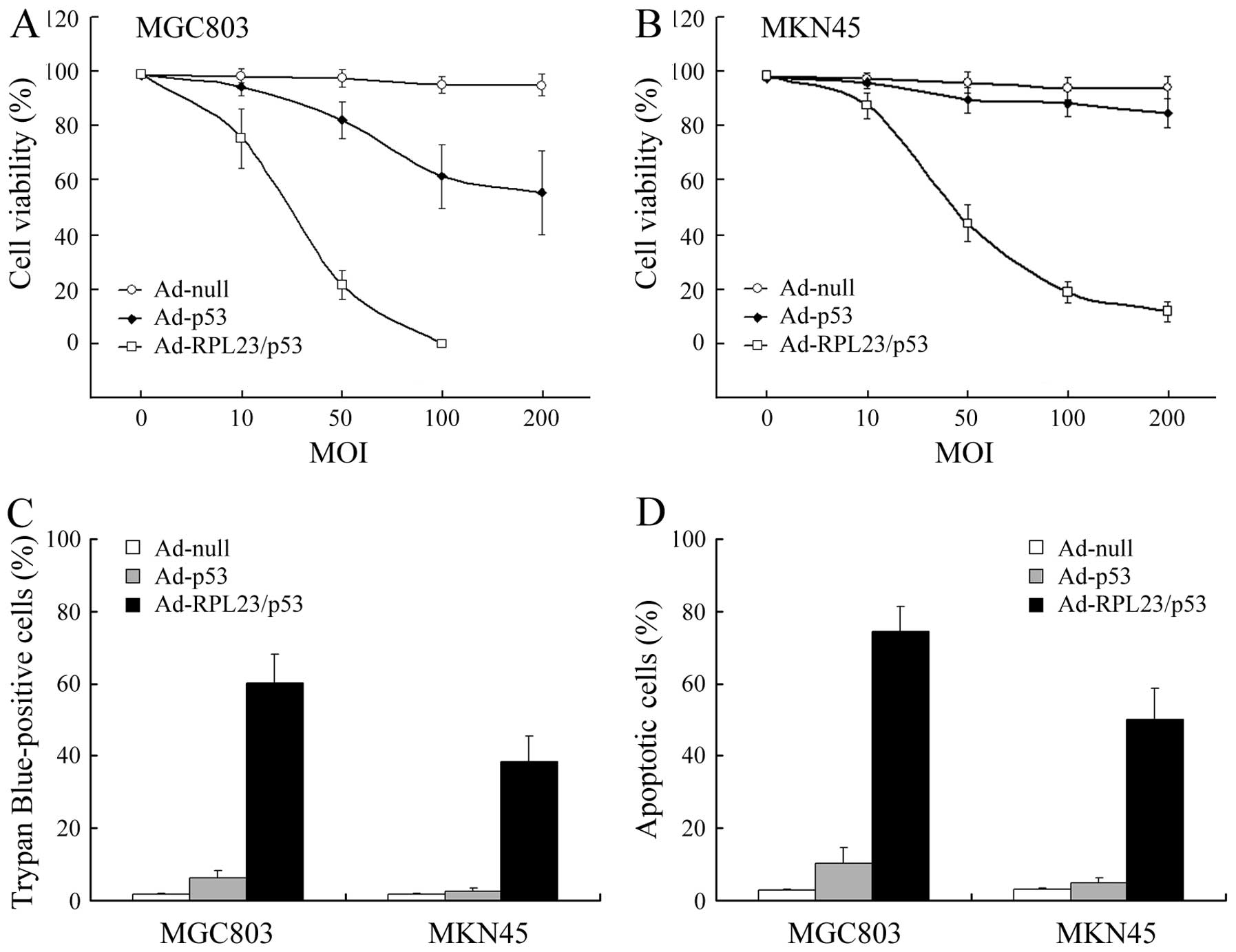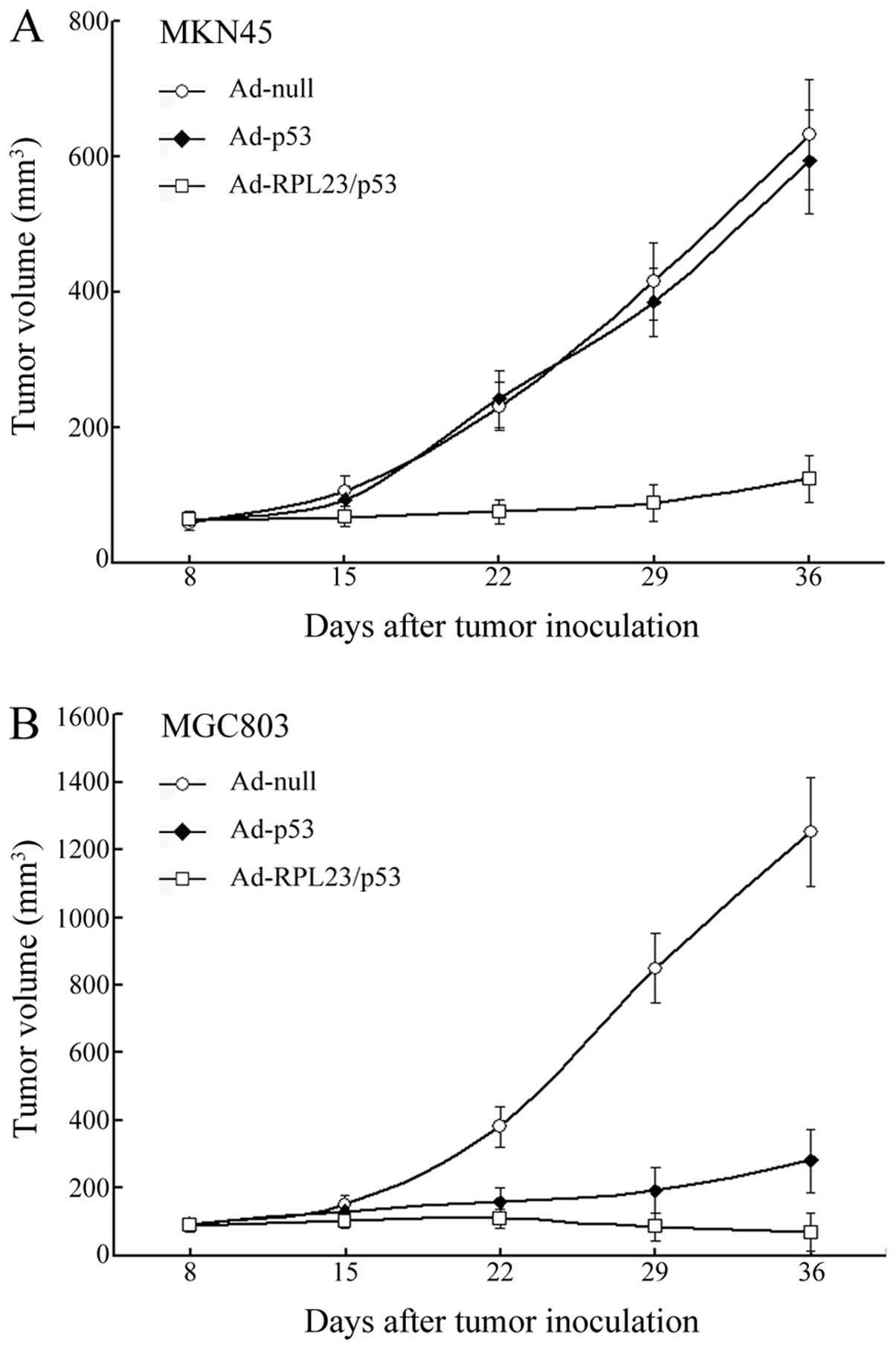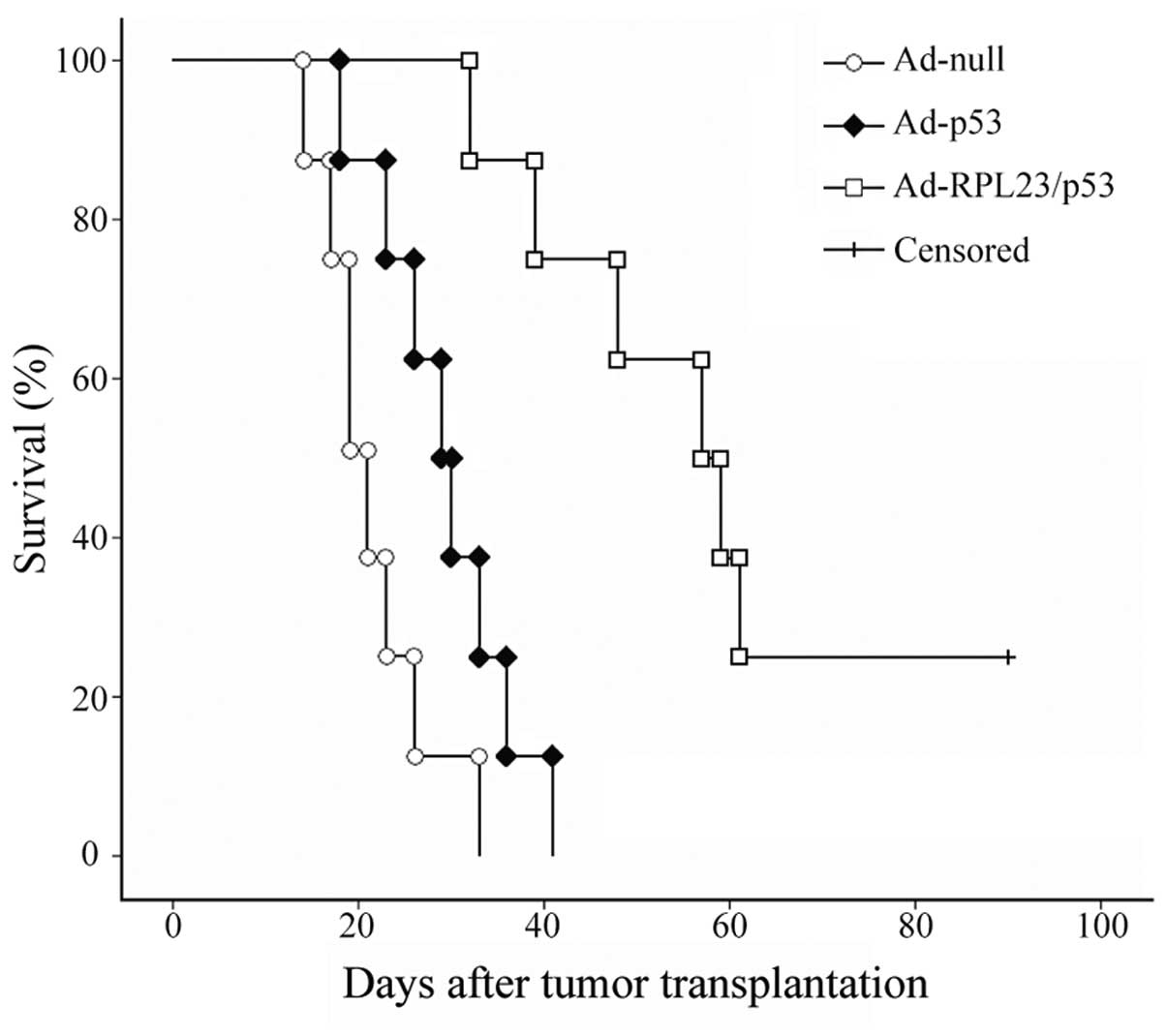|
1
|
Cheok CF, Verma CS, Baselga J and Lane DP:
Translating p53 into the clinic. Nat Rev Clin Oncol. 8:25–37. 2011.
View Article : Google Scholar
|
|
2
|
Brown CJ, Lain S, Verma CS, Fersht AR and
Lane DP: Awakening guardian angels: drugging the p53 pathway. Nat
Rev Cancer. 9:862–873. 2009. View
Article : Google Scholar : PubMed/NCBI
|
|
3
|
Lane DP and Lain S: Therapeutic
exploitation of the p53 pathway. Trends Mol Med. 8(Suppl 4):
S38–S42. 2002. View Article : Google Scholar : PubMed/NCBI
|
|
4
|
Lane DP, Cheok CF and Lain S: p53-based
cancer therapy. Cold Spring Harb Perspect Biol.
2:a0012222010.PubMed/NCBI
|
|
5
|
Momand J, Zambetti GP, Olson DC, George D
and Levine AJ: The mdm-2 oncogene product forms a complex with the
p53 protein and inhibits p53-mediated transactivation. Cell.
69:1237–1245. 1992. View Article : Google Scholar : PubMed/NCBI
|
|
6
|
Haupt Y, Maya R, Kazaz A and Oren M: Mdm2
promotes the rapid degradation of p53. Nature. 387:296–299. 1997.
View Article : Google Scholar : PubMed/NCBI
|
|
7
|
Kubbutat MH, Jones SN and Vousden KH:
Regulation of p53 stability by Mdm2. Nature. 387:299–303. 1997.
View Article : Google Scholar : PubMed/NCBI
|
|
8
|
Marine JC and Lozano G: Mdm2-mediated
ubiquitylation: p53 and beyond. Cell Death Differ. 17:93–102. 2010.
View Article : Google Scholar : PubMed/NCBI
|
|
9
|
Moll UM and Petrenko O: The MDM2-p53
interaction. Mol Cancer Res. 1:1001–1008. 2003.PubMed/NCBI
|
|
10
|
Shangary S and Wang S: Targeting the
MDM2-p53 interaction for cancer therapy. Clin Cancer Res.
14:5318–5324. 2008. View Article : Google Scholar : PubMed/NCBI
|
|
11
|
Wiman KG: Strategies for therapeutic
targeting of the p53 pathway in cancer. Cell Death Differ.
13:921–926. 2006. View Article : Google Scholar : PubMed/NCBI
|
|
12
|
van Beusechem VW, van den Doel PB and
Gerritsen WR: Conditionally replicative adenovirus expressing
degradation-resistant p53 for enhanced oncolysis of human cancer
cells overexpressing murine double minute 2. Mol Cancer Ther.
4:1013–1018. 2005.
|
|
13
|
Nishizaki M, Sasaki J, Fang B, Atkinson
EN, Minna JD, Roth JA and Ji L: Synergistic tumor suppression by
coexpression of FHIT and p53 coincides with FHIT-mediated MDM2
inactivation and p53 stabilization in human non-small cell lung
cancer cells. Cancer Res. 64:5745–5752. 2004. View Article : Google Scholar : PubMed/NCBI
|
|
14
|
Dai MS, Zeng SX, Jin Y, Sun XX, David L
and Lu H: Ribosomal protein L23 activates p53 by inhibiting MDM2
function in response to ribosomal perturbation but not to
translation inhibition. Mol Cell Biol. 24:7654–7668. 2004.
View Article : Google Scholar : PubMed/NCBI
|
|
15
|
Jin A, Itahana K, O’Keefe K and Zhang Y:
Inhibition of HDM2 and activation of p53 by ribosomal protein L23.
Mol Cell Biol. 24:7669–7680. 2004. View Article : Google Scholar : PubMed/NCBI
|
|
16
|
Zhang Y, Shi Y, Li X, et al: Inhibition of
the p53-MDM2 interaction by adenovirus delivery of ribosomal
protein L23 stabilizes p53 and induces cell cycle arrest and
apoptosis in gastric cancer. J Gene Med. 12:147–156.
2010.PubMed/NCBI
|
|
17
|
Ohashi M, Kanai F, Ueno H, et al:
Adenovirus mediated p53 tumour suppressor gene therapy for human
gastric cancer cells in vitro and in vivo. Gut. 44:366–371. 1999.
View Article : Google Scholar : PubMed/NCBI
|
|
18
|
Jiang XH, Wong BC, Lin MC, et al:
Functional p53 is required for triptolide-induced apoptosis and
AP-1 and nuclear factor-κB activation in gastric cancer cells.
Oncogene. 20:8009–8018. 2001.PubMed/NCBI
|
|
19
|
Sun S, Li XM, Li XD and Yang WS: Studies
on inducing apoptosis effects and mechanism of CIK cells for
MGC-803 gastric cancer cell lines. Cancer Biother Radiopharm.
20:173–180. 2005. View Article : Google Scholar : PubMed/NCBI
|
|
20
|
Kim HJ, Cho HI, Han YH, et al: Efficient
transduction with recombinant adenovirus in EBV-transformed B
lymphoblastoid cell lines. J Biochem Mol Biol. 37:376–382. 2004.
View Article : Google Scholar : PubMed/NCBI
|
|
21
|
Yang HY, Zhang WG, Ma LP, Wang SW and
Zhang ZY: An approach to enhancing the phototoxicity of a novel
hypocrellin congener to MGC803 cells. Dyes Pigments. 51:103–110.
2001. View Article : Google Scholar
|
|
22
|
Furukawa T, Kubota T, Watanabe M, Kitajima
M and Hoffman RM: Orthotopic transplantation of histologically
intact clinical specimens of stomach cancer to nude mice:
correlation of metastatic sites in mouse and individual patient
donors. Int J Cancer. 53:608–612. 1993. View Article : Google Scholar
|
|
23
|
Shi J, Wei PK, Zhang S, et al: OB glue
paste technique for establishing nude mouse human gastric cancer
orthotopic transplantation models. World J Gastroenterol.
14:4800–4804. 2008. View Article : Google Scholar : PubMed/NCBI
|
|
24
|
Ozaki T and Nakagawara A: p53: the
attractive tumor suppressor in the cancer research field. J Biomed
Biotechnol. 2011:6039252011. View Article : Google Scholar : PubMed/NCBI
|
|
25
|
Amaral JD, Xavier JM, Steer CJ and
Rodrigues CM: Targeting the p53 pathway of apoptosis. Curr Pharm
Des. 16:2493–2503. 2010. View Article : Google Scholar : PubMed/NCBI
|
|
26
|
Levine AJ: p53, the cellular gatekeeper
for growth and division. Cell. 88:323–331. 1997. View Article : Google Scholar : PubMed/NCBI
|
|
27
|
Tisato V, Norcio A, Voltan R, Celeghini C,
Zella D and Secchiero P: MDM2 non-genotoxic inhibitors as
innovative therapeutic approaches for the treatment of pediatric
malignancies. Curr Med Chem. 20:2226–2236. 2013. View Article : Google Scholar : PubMed/NCBI
|
|
28
|
Graat HC, Carette JE, Schagen FH, et al:
Enhanced tumor cell kill by combined treatment with a
small-molecule antagonist of mouse double minute 2 and adenoviruses
encoding p53. Mol Cancer Ther. 6:1552–1561. 2007. View Article : Google Scholar : PubMed/NCBI
|
|
29
|
Tango Y, Fujiwara T, Itoshima T, et al:
Adenovirus-mediated p14ARF gene transfer cooperates with
Ad5CMV-p53 to induce apoptosis in human cancer cells. Hum Gene
Ther. 13:1373–1382. 2002.PubMed/NCBI
|
|
30
|
Huang Y, Tyler T, Saadatmandi N, Borgstrom
P and Gjerset RA: Enhanced tumor suppression by a p14ARF/p53
bicistronic adenovirus through increased p53 protein translation
and stability. Cancer Res. 63:3646–3653. 2003.PubMed/NCBI
|















